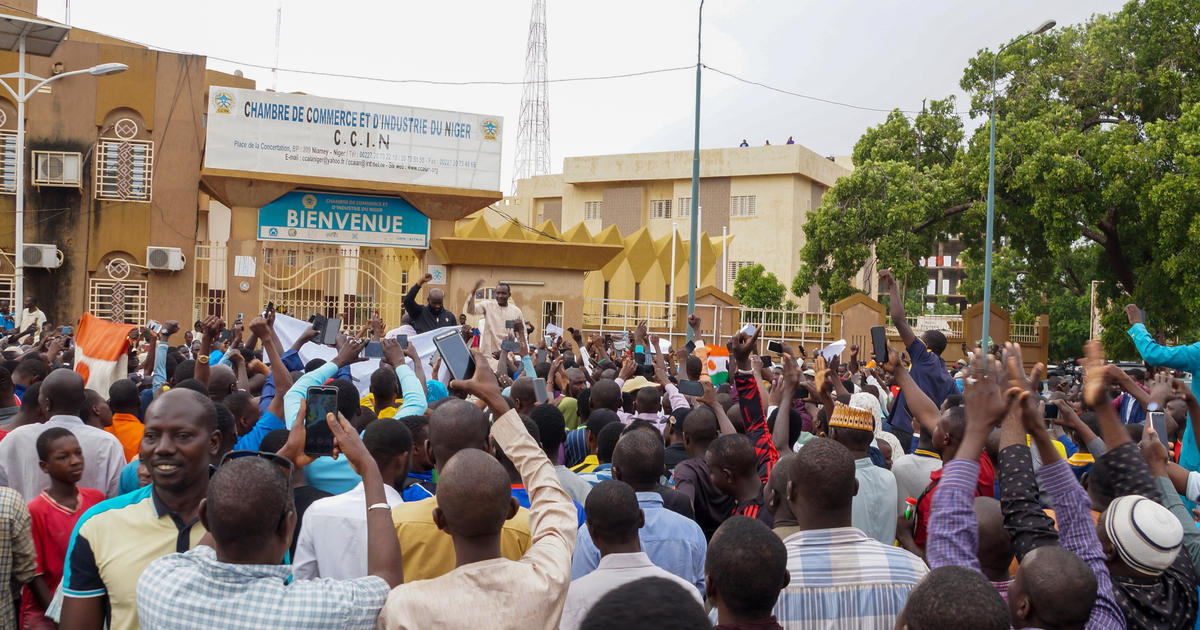Mutinous soldiers who staged a coup in Niger declared their leader the new head of state on Friday, hours after the general asked for national and international support despite rising concerns that the political crisis could hinder the nation’s fight against jihadists and boost Russia’s influence in West Africa.
Spokesman Col. Maj. Amadou Abdramane said on state television that the constitution was suspended and Gen. Abdourahmane Tchiani was in charge.
Various factions of Niger’s military have reportedly wrangled for control since members of the presidential guard detained President Mohamed Bazoum, who was elected two years ago in Niger’s first peaceful, democratic transfer of power since independence from France.
Balima Boureima/Anadolu Agency via Getty Images
Secretary of State Antony Blinken spoke with Bazoum Friday, according to State Department spokesperson Matthew Miller.
In the call, Blinken “reiterated” the U.S.’ “unflagging support” for Bazoum and “emphasized the importance of his continuing leadership.”
Blinken also “underscored that the U.S. will continue to work to ensure the full restoration of constitutional order and democratic rule in Niger,” Miller said in a statement.
A western military official in Niger who was not authorized to speak to the media also said the military factions were believed to be negotiating, but that the situation remained tense and violence could erupt.
Niger is seen as the last reliable partner for the West in efforts to battle jihadists linked to al-Qaida and the Islamic State group in Africa’s Sahel region, where Russia and Western countries have vied for influence in the fight against extremism. France has 1,500 soldiers in the country who conduct joint operations with the Nigeriens, and the United States and other European countries have helped train the nation’s troops.
The coup sparked international condemnation and the West African regional group ECOWAS, which includes Niger and has taken the lead in trying to restore democratic rule in the country, scheduled an emergency summit in the Nigerian capital, Abuja, on Sunday.
The U.N. Security Council strongly condemned efforts “to unconstitutionally change the legitimate government.” Its statement, agreed to by all 15 members including the U.S. and Russia, called for “the immediate and unconditional release” of Bazoum and expressed concern over the negative effect of coups in the region, the “increase in terrorist activities and the dire socio-economic situation.”
Extremists in Niger have carried out attacks on civilians and military personnel, but the overall security situation is not as dire as in neighboring Mali and Burkina Faso — both of which have ousted the French military. Mali has turned to the Russian private military group Wagner, and it’s believed that the mercenaries will soon be in Burkina Faso.
Now there are concerns that Niger could follow suit. Before the coup, Wagner, which has sent mercenaries around the world in support of Russia’s interests, already had its sights set on Niger, in part because it’s a large producer of uranium.
“We can no longer continue with the same approaches proposed so far, at the risk of witnessing the gradual and inevitable demise of our country,” Tchiani, who also goes by Omar Tchiani, said in his address. “That is why we decided to intervene and take responsibility.”
“I ask the technical and financial partners who are friends of Niger to understand the specific situation of our country in order to provide it with all the support necessary to enable it to meet the challenges,” he said.
If the U.S. designates the takeover as a coup, Niger stands to lose millions of dollars of military aid and assistance.
The mutinous soldiers, who call themselves the National Council for the Safeguarding of the Country, accused some prominent dignitaries of collaborating with foreign embassies to “extract” the deposed leaders. They said it could lead to violence and warned against foreign military intervention.
Bazoum has not resigned and he defiantly tweeted from detention on Thursday that democracy would prevail.
It’s not clear who enjoys majority support, but the streets of the capital of Niamey were calm Friday, with a slight celebratory air. Some cars honked in solidarity at security forces as they drove by — but it was not clear if that meant they backed the coup. Elsewhere, people rested after traditional midday prayers and others sold goods at their shops and hoped for calm.
“We should pray to God to help people come together so that peace comes back to the country. We don’t want a lot of protests in the country, because it is not good … I hope this administration does a good job,” said Gerard Sassou, a Niamey shopkeeper.
On Thursday, Vice President Kamala Harris said the country’s “substantial cooperation with the Government of Niger is contingent on Niger’s continued commitment to democratic standards.”
The United States in early 2021 said it had provided Niger with more than $500 million in military assistance and training programs since 2012, one of the largest such support programs in sub-Saharan Africa. The European Union earlier this year launched a $30 million military training mission in Niger.
The U.S. has more than 1,000 service personnel in the country.
Some military leaders who appear to be involved in the coup have worked closely with the U.S. for years. Gen. Moussa Salaou Barmou, the head of Niger’s special forces, has an especially strong relationship with the U.S., the Western military official said.
For all the latest World News Click Here
For the latest news and updates, follow us on Google News.

